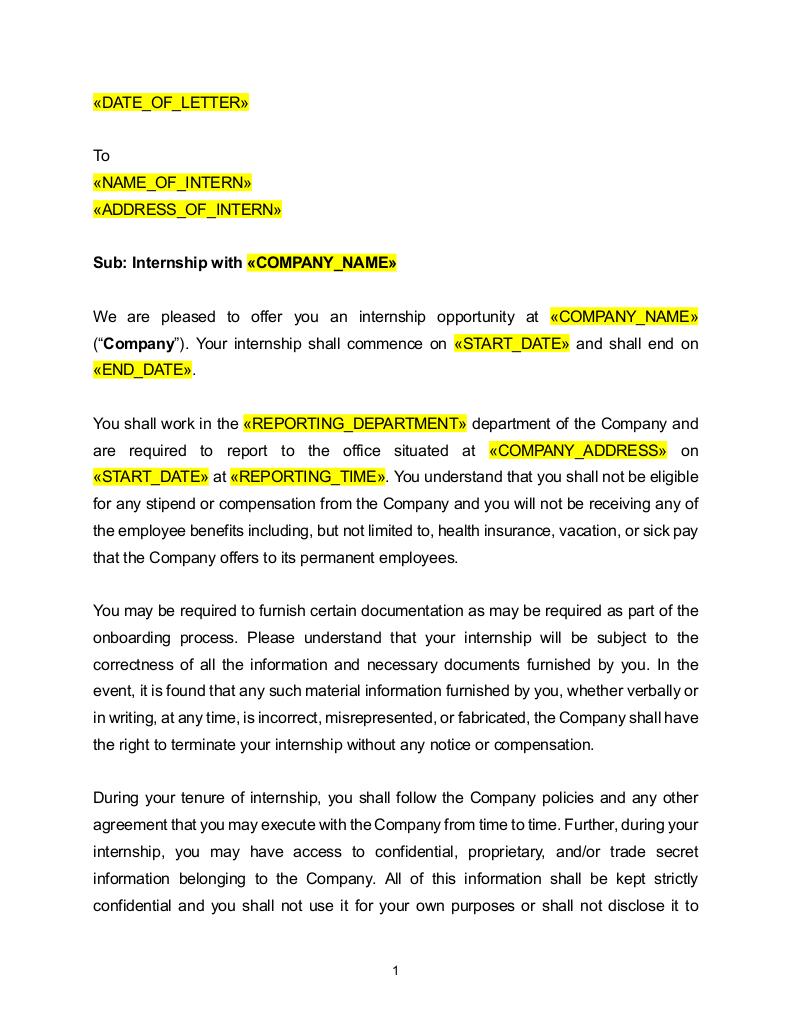If you are one of those seeking new careers via an internship, you will probably be curious about what an internship offer letter is and if it is legally binding or not. An internship offer letter is a formal document that presents in writing the terms and conditions for the job one might do. The offer letter should also contain other information, including how much you will get paid, and how long the internship will last. Aside from this, you should find out if the document is legally binding; that is, if it can be tendered as a legal document between you and the employer. Is an internship offer letter legally binding? We will provide helpful answers to this question in the course of the write-up. This write-up will also discuss the circumstances under which an internship offer letter can be regarded as legally binding.

Vital Details in an Internship Offer Letter?
As described above, an internship offer letter is a formal document that an employer issues to a candidate selected for an internship position. Through best practices in writing these letters, an organization can pave the way for smoother onboarding and minimize the potential for disputes down the line.
The terms and conditions of an internship offer letter have to be clear to both the interns and the employer. Proper communication brings about good working relations between the two parties, which is beneficial to all in the process of this great opportunity for career development. However, a legally binding internship offer letter should contain certain vital details as described below:
- Company name
- Title of the internship position
- Dates of commencement and end of internship
- Anticipated work schedule
- Information about pay, whether paid or not
- Job title and responsibilities
- Legal disclaimers, including but not limited to non-compete and non-disclosure agreements
- Acceptance statement and signature space
The letter serves as formal confirmation of the internship offer, including what is expected from both parties.
Is an Internship Offer Letter Legally Binding?
An internship offer letter can be legally binding if it meets the set criteria generally applicable to contracts, which includes containing the various details mentioned earlier. For a document to be treated as a legally binding contract, there should be:
- Offer: A clear proposal made by the employer to the intern, outlining the terms, conditions, and responsibilities of the role.
- Acceptance: The intern's agreement to the terms stated in the offer letter, confirms mutual understanding and consent to proceed.
- Consideration: The exchange of value between parties, such as the intern’s work for compensation, experience, or professional development.
- Intention: Both parties must have a mutual intent to form a legally binding agreement under the stated terms and conditions.
- Capacity: Both the employer and intern must possess the legal capacity to enter into and fulfill the contract's obligations.
So, it is mandatory for the document to contain all the details highlighted above for it to be considered a legally binding internship offer letter.

Conditions for Legally Binding Status
You should check the internship offer letter against the conditions highlighted below when determining if it qualifies as a legally binding document:
- Clear terms: The offer letter must contain specific terms regarding the internship, such as job responsibilities, duration, and compensation. Vague or ambiguous language can undermine its enforceability.
- Acceptance: The intern must formally accept the offer by signing the letter or responding in writing. This acceptance indicates that both parties agree to the terms outlined.
- Consideration: The student accepts consideration by agreeing to do work related to the internship in return for experience or money.
- Intention to create legal relations: The offer letter should reflect that there is an intention between parties to create legal relations.
- Legality of terms: All the terms mentioned in the offer letter must be in concurrence and compliance with the applicable laws and regulations. If a portion of an agreement is illegal or opposed to public policy, it is not necessarily enforceable.
Examples of Binding Internship Offer Letters
- Binding example: This internship offer letter would be considered legally binding if it contains explicit words like an intern being paid during the internship, describing particular job duties, and has something that shows that by signing both parties agree upon mutual acceptance of the terms.
- Non-binding example: On the contrary, an offer letter, on receipt of which disclaimers regarding it not being intended to be legally binding or any information about compensation or roles to be played is withheld, does not have binding abilities upon the parties either.
Legal Implications of Internship Offer Letters
Though most internship letters of offer are not as enforceable as full employment contracts, they do have a bearing on the law.
- Clarity in expectations: An internship offer letter helps in stating the expectations that both parties have for the time period of the internship. This will reduce misunderstandings and demarcate responsibilities.
- Dispute possibility: In case of any dispute about the job responsibilities or compensation either during or at the end of the internship, a signed offer letter can be used as proof of what was agreed upon in the beginning.
- Compliance with labor laws: The internship programs have to be carefully designed according to labor laws related to internships, specifically unpaid internships. An offer letter with compensation can help address compliance with such regulations.
- Limitations of liability: A properly written offer letter protects the employer and the intern against liabilities by clearly spelling out the responsibilities and expectations, which could reduce liability arising from disputes.

Best Practice in Writing An Internship Offer Letter
Following are some best practices to make your internship offer letter as clear as possible and even legally binding:
1. Use clear language: Employ precise, unambiguous language in the letter. Clearly describe job responsibilities, compensation structure, and expected duration. Avoid using vague terms that might confuse the recipient or leave room for misinterpretation of critical details.
2. Include essential details: Provide all key information like start date, working hours, reporting structure, and job location. This ensures clarity for the intern and sets appropriate expectations, reducing any potential misunderstandings about their responsibilities or schedule.
3. Add legal disclosures: Incorporate non-disclosure and non-compete clauses, if necessary, to protect the company’s proprietary information and intellectual property. These agreements ensure company interests remain safeguarded throughout the internship duration and beyond.
4. Acceptance statement: Include a clearly defined section for the intern to sign and date their acceptance of the letter. This signature serves as a formal acknowledgment of the terms and conditions outlined in the document.
5. Legal review: When uncertain about the legality of specific terms in the offer letter, consult a qualified legal professional. Doing so ensures compliance with labor laws and avoids unintended legal complications for the company.
FAQs
Q: What if I have changed my mind once I have accepted?
If later on, you decide to decline an already accepted internship, it should be in writing as soon as possible and professional to the employer. With any provisions specified in an offer letter aside, under company policy, one may not have legal liability, but your professional reputation will most likely be damaged.
Q: What do most internship offer letters contain?
A comprehensive internship offer letter will contain:
- Title and position: Clearly outline your designation and responsibilities.
- Date of commencement and end dates: Specify the duration of the internship.
- Remuneration details: Specify if paid/unpaid.
- Working pattern: Expected hours and days.
- Confidentiality clauses: Any non-disclosure agreements or confidentiality clauses.
Q: In what way does an offer letter for an internship differ from an employment contract?
A: While both are formal documents, there are major differences in their scope and legal weight:
- Scope: An employment contract normally encompasses broader areas of employment, including conditions for termination, benefits, and job security. An internship offer letter is concerned with the terms of the internship only.
- Legal weight: Employment contracts are usually heavier in terms of legal weight than internship offer letters, except in specific conditions that may render the latter legally enforceable.
Q: Are there legal protections for interns?
A: Legal protection may be accorded to interns, both as employees or non-paid interns, based on the jurisdiction they are found in. For instance:
- Labor laws: In many jurisdictions, labor laws require that unpaid internships provide some educational benefit to the interning student.
- Discrimination protections: Under various anti-discrimination laws, interns may be considered employees.
Conclusion
An internship offer letter can be legally binding, provided there is a meeting of the precise criteria of contract law. Employers can make effective documents that protect both parties' interests by including clear terms, obtaining acceptance from the intern, providing consideration, and making sure that applicable laws are complied with. These factors will help transform the document into a legally binding internship offer letter. Although not all internship offers carry the same legal weight as formal employment contracts, they are nonetheless important documents that detail expectations and responsibilities for the length of an internship. Before concluding that the offer letter you have with you is legally binding, you should first check if it meets the criteria described above.





